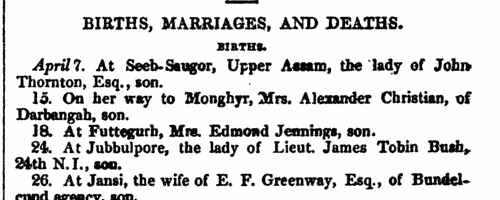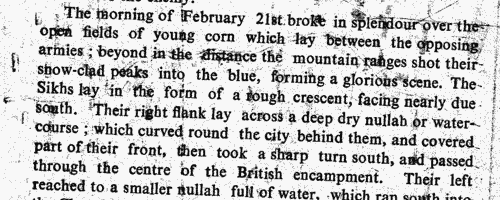Cheape Surname Ancestry ResultsOur indexes 1000-1999 include entries for the spelling 'cheape'. In the period you have requested, we have the following 61 records (displaying 31 to 40): Single Surname Subscription | | | Buying all 61 results of this search individually would cost £306.00. But you can have free access to all 61 records for a year, to view, to save and print, for £100. Save £206.00. More... |
These sample scans are from the original record. You will get scans of the full pages or articles where the surname you searched for has been found. Your web browser may prevent the sample windows from opening; in this case please change your browser settings to allow pop-up windows from this site. Deaths, Marriages, News and Promotions
(1842)
Death notices and obituaries, marriage and birth notices, civil and military promotions, clerical preferments and domestic occurrences, as reported in the Gentleman's Magazine. Mostly from England and Wales, but items from Ireland, Scotland and abroad.
CHEAPE. Cost: £4.00.  | Sample scan, click to enlarge

| Dissolutions of Partnerships
(1842)
Trade partnerships dissolved, or the removal of one partner from a partnership of several traders, in England and Wales
CHEAPE. Cost: £6.00.  | Sample scan, click to enlarge

| Bankrupts' Assignees
(1843)
Assignees of bankrupts' estates (usually principal creditors and/or close relatives of the bankrupt) in England and WalesCHEAPE. Cost: £6.00.  | Sample scan, click to enlarge

| Calcutta Births
(1843)
The Indian Mail, 'A Monthly Register for British & Foreign India, China, & Australasia' commenced publication 9 May 1843 as a continuation of the digest of Eastern intelligence that thitherto had formed a part of the Asiatic Journal. The Register section contained notices of births, marriages and deaths from the presidencies of Calcutta (extending across northern India, and into Burma), Madras, and Bombay (including Aden), as well as Australasia, Ceylon, China, Cape of Good Hope, Mauritius, and Singapore.
CHEAPE. Cost: £6.00.  | Sample scan, click to enlarge

| Petitioning Creditors and Solicitors
(1843)
Principal creditors petitioning to force a bankruptcy (but often close relatives of the bankrupt helping to protect his assets): and solicitorsCHEAPE. Cost: £6.00.  | Sample scan, click to enlarge

| Merchant Seamen (1835-1844)
At this period, the foreign trade of ships plying to and from the British isles involved about 150,000 men on 15,000 ships; and the coasting trade about a quarter as many more. A large proportion of the seamen on these ships were British subjects, and so liable to be pressed for service in the Royal Navy; but there was no general register by which to identify them, so in 1835 parliament passed a Merchant Seamen's Registration Bill. Under this act a large register of British seamen was compiled, based on ships' crew lists gathered in British and Irish ports, and passed up to the registry in London. A parliamentary committee decided that the system devised did not answer the original problem, and the register was abandoned after less than two years: the system was then restarted in this form, with a systematic attempt to attribute the seamen's (ticket) numbers, and to record successive voyages. The register records the number assigned to each man; his name; age; birthplace; quality (S = seaman, &c.); and the name and official number of his ship, with the date of the crew list (usually at the end of a voyage). Most of the men recorded were born in the British Isles, but not all. The system was still very cumbersome, because the names were amassed merely under the first two letters of surname; an attempt was made to separate out namesakes by giving the first instance of a name (a), the second (b), and so on. In this volume the register is restarted from 1840 onwards, with the mariner's previous number (if any) being entered in the column after his birthplace. In the event of it becoming known that a man had died during the course of a voyage, that information is written across the remaining empty columns. This volume (BT 112/12) covers mariners whose surnames start with Ce (and McCe), Ch (and McCh) and a handful with Ci.
CHEAPE. Cost: £8.00.  | Sample scan, click to enlarge

| Deaths, Marriages, News and Promotions
(1844)
Death notices and obituaries, marriage and birth notices, civil and military promotions, clerical preferments and domestic occurrences, as reported in the Gentleman's Magazine. Mostly from England and Wales, but items from Ireland, Scotland and abroad.
CHEAPE. Cost: £4.00.  | Sample scan, click to enlarge

| Deaths, Marriages, News and Promotions
(1845)
Death notices and obituaries, marriage and birth notices, civil and military promotions, clerical preferments and domestic occurrences, as reported in the Gentleman's Magazine. Mostly from England and Wales, but items from Ireland, Scotland and abroad.
CHEAPE. Cost: £4.00.  | Sample scan, click to enlarge

| Deaths, Marriages, News and Promotions
(1848)
Death notices and obituaries, marriage and birth notices, civil and military promotions, clerical preferments and domestic occurrences, as reported in the Gentleman's Magazine. Mostly from England and Wales, but items from Ireland, Scotland and abroad. July to December 1848.CHEAPE. Cost: £4.00.  | Sample scan, click to enlarge

| British Army officers in the annexation of the Punjab
(1845-1849)
By 1845 the Sikh state of Lahore was the remaining substantial military power in the Indian sub-continent outside British rule. Its khalsa army was well equipped, disciplined, tenacious and had three European officers among its commanders. The sikhs controlled not only the Punjab, but Pathan tribes as far as the border with Afghanistan, and the whole of Kashmir. The river Sutlej formed the boundary between the Sikh state and British India. In early December 1845 the Sikh army crossed the Sutlej and invested the British garrisons at Ferozepore; 13 December 1845 the British declared war. After defeat in a series of battles, at Moodkee (18-21 December), Ferozeshah (21-22 December); Budhowal and Aliwal (23 December, 28 January); and Sobraon (10 February 1846), the state of Lahore submitted to the Treaty of Lahore, ceding the Punjab between the Sutlej and the Beas, Kashmir, and paying half a crore of rupees. The state of Lahore itself continued under the durbar as a British protectorate during the minority of the young maharajah; and the Sikh army was put under British command. Kashmir was sold by the British to the ruler of Jammu for a crore, and the submission of Kashmir to Jammu was effected by a Sikh force under British officers. British garrisons were placed in the Punjab, but the fort at Multan refused to submit, and had to be besieged. During the siege a Sikh regiment defected to join other khalsa remnants, in defiance of the durbar at Lahore, and raised a rebellion (August 1848 to January 1849). Battles at Chillianwalla (13 January 1849) and Gujerat (21 February 1849) destroyed the Sikh army. The British then annexed the whole of the Punjab, incorporating it into British India. This account of the Annexation of Punjab by Arthur D. Innes and General Charles Gough was published in 1897, but with a poor index; we have remedied that. The account also includes a description of the battles of Maharajapore and Puniar (29 December 1843) by which the army of Gwalior was destroyed. CHEAPE. Cost: £6.00.  | Sample scan, click to enlarge

|
Research your ancestry, family history, genealogy and one-name study by direct access to original records and archives indexed by surname.
|












